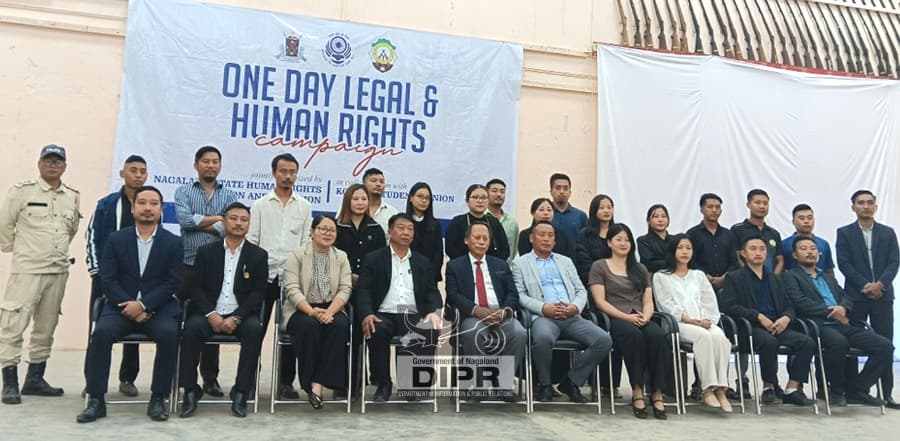TUESDAY, NOVEMBER 18, 2025
- Home
- Justice Serto highlights Nagaland State Human Rights Commission's role in Mon, Tizit
Justice Serto highlights Nagaland State Human Rights Commission's role in Mon, Tizit
Chairman Justice Songkhupchung Serto highlights the role of the Nagaland State Human Rights Commission during campaigns in Mon and Tizit.
Share

DIMAPUR — A one-day Legal and Human Rights Campaign was held on Tuesday at the Konyak Union (KU) Office Hall, Mon, with Justice Songkhupchung Serto, chairman of the Nagaland State Human Rights Commission (NSHRC), as the chief guest.
According to a DIPR report, the programme was jointly organised by the NSHRC and the District Legal Services Authority (DLSA) Mon, in collaboration with the Konyak Students’ Union (KSU).
Addressing the gathering, Justice Serto pointed out that the Universal Declaration of Human Rights is one of the most influential documents and encouraged all the tribes in Nagaland to translate it into their own languages for better understanding.
He said the Human Rights Commission empowers citizens to recognise and defend their fundamental rights, holding public authorities accountable for violations and fostering a society that values human dignity and equality. He urged the gathering to make use of the office, know their rights, and fight for justice.
Advocate Moba Konyak, deputy legal aid defence counsel, DLSA Mon, spoke on “Right to health and education as human rights”, while “Protection of Human Rights Act” was explained by Adv. R Nzanbemo Lotha, member of NSHRC.
Read more local news: Naga Common Platform rally urges early, honourable political solution
Nagaland Liquor Prohibition Act a ‘total failure’ — Advisor Wangpang Konyak
The NSHRC team also visited the Mon District Hospital, district jail, police station and Government Higher Secondary School “C” Mon.
Earlier, Justice Serto, accompanied by Nzanbemo, visited Tizit on November 17 and held an awareness programme with officials of various government departments and stakeholders at the conference hall of the Assistant Deputy Commissioner’s Office, Tizit.
The chairman briefed the gathering on the formation of the Human Rights Commission, stating that the Commission is empowered as a civil court and that its justice deliberation process is simple and free of cost.
Highlighting some of the cases taken up by the Commission, he said that when basic rights such as health, education, and food are adequately provided, people are in a much better position. Stating that the primary duty of the state is to protect and provide for its people, Justice Serto said that the Human Rights Commission steps in when the state fails to do so or violates their rights.
Recalling the origins of human rights, Justice Serto said that the Universal Declaration of Human Rights adopted by the United Nations is regarded as one of the most important documents and that India was among its first signatories.
Nzanbemo also briefed the gathering about the Commission and the purpose of their visit.
During the visit, the team also interacted with officials from various in-line departments and representatives of different organisations. The chairman and the member also visited the Community Health Centre, the Government Higher Secondary School, and the Tizit Police Station.

